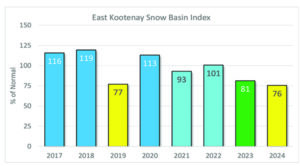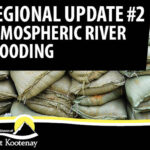Home »

Snowpack level report indicates drought ahead
 The most recent River Forecast Centre snow survey and water supply bulletin paints a picture of drought ahead for British Columbia.
The most recent River Forecast Centre snow survey and water supply bulletin paints a picture of drought ahead for British Columbia.
The Ministry of Water, Land and Resource Stewardship’s River Forecast Centre report says the average snowpack for the province is 63% of normal, with the East Kootenay sitting at 76% of normal.
The report prompted Nathan Cullen, Minister of Water, Land and Resource Stewardship, to April 10 state: “The latest snow survey and water supply bulletin from the River Forecast Centre (RFC) indicates we may be facing drought conditions in B.C. once again this year.
“The April survey shows that the overall snowpack level for B.C. is at 63% of normal, the lowest in 50 years. The experts at the River Forecast Centre tell us these low levels and the impacts of year-over-year drought are creating significantly higher drought risk for this spring and summer.”
The RFC report outlines: “There are concerns for drought extending into the spring and summer with the low snowpack throughout the province. With approximately two to four weeks left for possible snow accumulation, snowpack levels and the seasonal flood and drought outlook are unlikely to change substantially. Due to an increased chance of warmer seasonal temperatures, the below-normal snowpack could result in one of the earliest snowmelt seasons on record. This will play an important role in streamflow later in the spring and summer, with early snowmelt diminishing contributions to river runoff.”
Data for the monthly report is collected from 106 manual snow courses and 105 automated snow weather stations around the province (collected by the Ministry of Environment and Climate Change Strategy’s Snow Survey Program, BC Hydro and partners), and climate data from Environment and Climate Change Canada (ECCC) and the provincial Climate Related Monitoring Program.

The monthly report indicates it’s time for all British Columbians to pull together to help one another out, Minister Cullen said.
“We know this is concerning news. Communities around B.C. experienced serious drought conditions last summer. It fuelled the worst wildfire season ever, harmed fish and wildlife, and affected farmers, ranchers, First Nations and industry.
“While some parts of B.C. still could experience prolonged rain or much needed late season snowfall, we are taking action now to help communities, farmers and industry prepare for drought now so we can respond quickly, recover faster and be more ready for drier conditions,” Cullen said.
“As B.C. experiences more extreme weather and climate-related emergencies, our government will continue to take strong action to strengthen B.C.’s resiliency to drought.
“Everyone can do their part to practise conservation by taking small steps to reduce their water consumption, whether that means taking shorter showers, watering your lawn sparingly or not at all and, most importantly, following local water restrictions. B.C. businesses, local governments, First Nations, and community and environmental organizations are working to conserve water and reduce water usage. Small changes make a big difference when we do them together.
“Our government will continue to monitor stream flows and groundwater levels in the weeks and months ahead, and we will take extra steps as necessary. We are prepared for this, and we will all get through this together.”
The River Forecast Centre continues to monitor snowpack conditions and will provide an updated seasonal risk forecast in the May 1 bulletin scheduled for release on May 9.
e-KNOW







